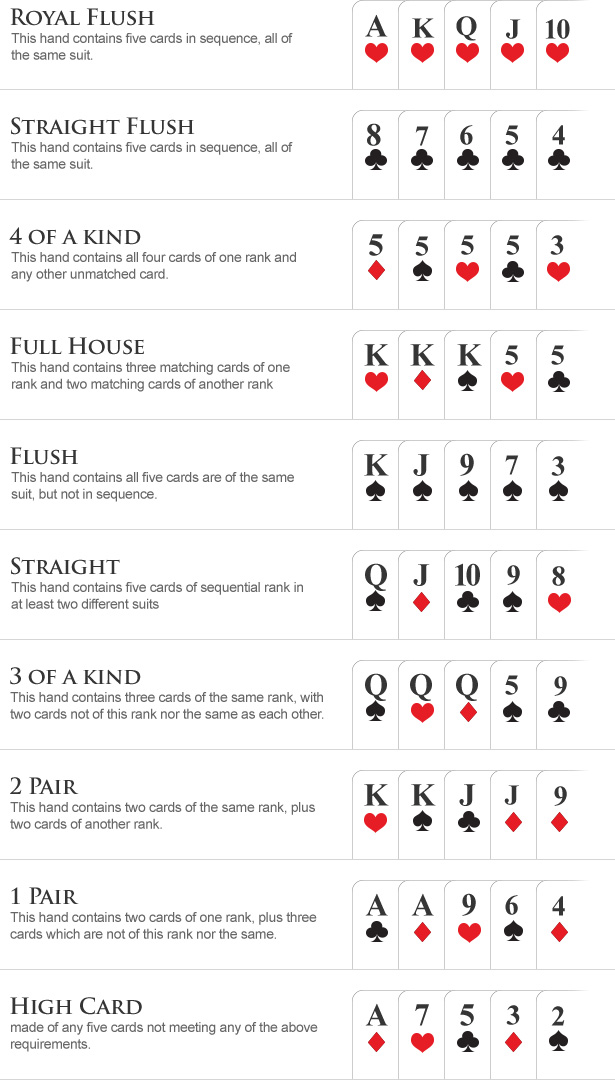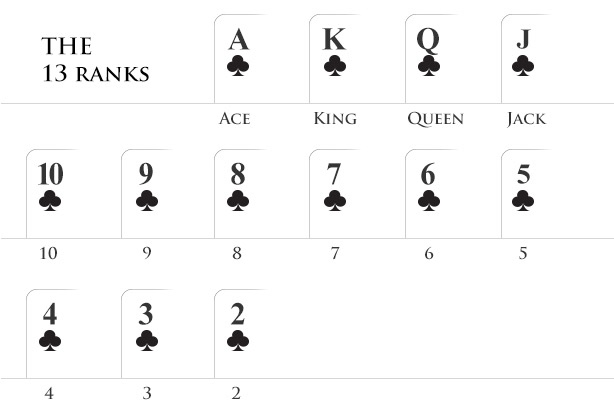Ace rag is almost definitely the most overplayed and overrated hand in Texas Holdem. Even professionals will occasionally overplay the ace if they’ve been dealt junk for hours. The truth is, unless you are in position or shorthanded, these hands are unlikely to generate you much money or help build your stack much. Playing A5, A4, A3, and A2 in Texas Holdem. Playing pocket Ace Five, Ace Four, Ace Three, and Ace Two Off Suit and Ace Five, Ace Four, Ace Three, and Ace Two Suited in Texas Hold'em Poker. If you have been following this series, you will notice that most of the articles contain advice about only one hand. Poker Hand Combinations Explained. Poker hands fall into one of ten categories. The highest is a royal flush, followed by a straight flush, then four of a kind, a full house, a flush, a straight. As in a regular straight, you can have an ace either high (A-K-Q-J-T) or low (5-4-3-2-1). However, a straight may not 'wraparound'. (Such as K-A-2-3-4, which is not a straight). An Ace high straight-flush is called a Royal Flush and is the highest natural hand. Four of a Kind Four of a kind is simply four cards of the same rank. This is now the most popular variant of poker. It is a variant of community card poker: In this kind of poker, some cards are revealed to the whole table, and each player can use those cards to build his or her 5-card hand. A round begins with blind bets, and sometimes ante bets.
I ran into a friend of mine yesterday who was jealous because a bunch of our mutual friends were playing Texas holdem Saturday night. She was bummed because she never learned to play poker.
I told her it was easy to learn, and the first thing she needed to do was learn about poker hands and poker hand rankings.
And that gave me the subject for my latest blog post.
Poker Hands Are Almost Always Made Up of Five Cards
In fact, I’m not sure of an exception to this rule. Poker isn’t one game, of course, it’s multiple games that have a couple of things in common:
- They have a betting structure where you can decide to continue to play or not
- They use five-card hands that usually win based on the standard poker hand rankings
Can An Ace Be Used As A 1 In Texas Holdem Game
If you’re playing Seven-Card Stud, for example, you get seven cards, but you use the best five-card hand you can make to determine the winner.
Can An Ace Be Used As A 1 In Texas Holdem Tournaments
If you’re playing Texas holdem, you have two cards in your hand and five face-up cards that you share with other players. You make the best five-card hand you can using any combination of those seven cards.
If you’re playing Omaha, you have four cards in your hand and five face-up cards that you share with the other players. But you still make the best five-card hand that you can, using two cards from your hand and three cards from the community cards.

Ranks and Suits
Poker is almost always played with a standard 52-card deck of playing cards. Each card has two attributes:

- A rank
- A suit
You have four suits—clubs, diamonds, hearts, and spades. In each of those suits, you have 13 ranks—2, 3, 4, 5, 6, 7, 8, 9, 10, jack, queen, king, and ace. The ace is unusual because it can be the highest OR the lowest card. It can rank above the king, but it can also count as a “1.”
Flushes, Straights, and Straight Flushes
The ranks and suits become important when you have a flush, a straight, or a straight flush.
A flush is just five cards of the same suit. They can all be clubs, diamonds, hearts, or spades, it doesn’t matter. If you face an opponent who also has a flush, the player whose flush has the highest ranked card wins. An ace would be the highest card in any flush.

A straight is just five cards where the ranks are in succession. It doesn’t matter what suit the cards are, it only matters that the cards are made up of consecutive ranks.
For example, an A2345 is a straight, but so is a 10JQKA.
In the prior example, the ace counts as 1, but in the second, the ace counts as the highest card in the hand, above the king.
If multiple opponents have a straight, the one with the highest card in the straight wins. But if the ace is used as a 1 to make an ace to 5 straight, it counts as a low card for this purpose.
A straight flush is a hand where the cards are all consecutive, AND they’re all of the same suit.
Pairs, Trips, Quads, and Full Houses
All the other possible poker hands you can make have nothing to do with consecutive ranks or suited cards. They have to do with how many cards of a specific rank you have.
A pair, for example, is a hand where you have two cards of the same rank and three other cards. If you and your opponent both have a pair, the higher-ranked pair wins. A pair of aces beats a pair of kings, for example.
Two pair is a hand made up of two cards of one rank and two cards of another rank, plus a third card of still another rank. Three of a kind is a hand made up of three cards of the same rank and two other cards.
A full house is a three of a kind with a pair, three cards of one rank and two cards of another. And, of course, four of a kind is four cards of the same rank.
In all these examples, the highest-ranked card determines the winner.
The Standard List of Poker Hand Rankings
So far, I’ve discussed the various poker hands you can have in relation to the attributes of the cards. I haven’t given them a ranking. Almost all poker games use the same ranking system.
From best to worst, here are the poker hand rankings:
- Straight flush
- Four of a kind
- Full house
- Flush
- Straight
- Three of a kind
- Two pair
- A pair
A straight flush always beats four of a kind or anything lower. A four of a kind always beats a full house or anything lower. And so on, through the end of the poker hand rankings list.
The first element of poker strategy any new poker player should master is the poker hand rankings. If you don’t know what beats what in poker, you can’t possibly make the correct decisions.
Can An Ace Be Used As A 1 In Texas Holdem Card Game
How These Hand Rankings Are Determined
The poker hand rankings are sorted this way based on the probability you’ll be dealt such a hand. The less likely it is to get a hand, the more it’s worth.
Also, most poker hand ranking lists include a separate listing for a royal flush, which is just the highest possible straight flush you can have. The only thing that makes it different from any other straight flush is how high your highest card ranks, but we don’t break four aces into a separate listing.
So, I don’t break a royal flush out into its own listing either.
Starting Hand Rankings in Texas Holdem
I could write about poker hand rankings all day, but for now, let me just address starting hands in Texas holdem.
Your starting hand in a game of Texas holdem consists of the two cards you get face down at the beginning of the game. These are the two cards you get to look at before deciding whether to play the hand at all.
The best possible starting hand in Texas holdem is a pair of aces. Often, a pair of aces can win a hand even if it doesn’t improve with the other cards. The rankings continue from there like this:
- Pocket aces
- Pocket kings
- Pocket queens
- Ace king suited
- Pocket jacks
- Pocket 10s
- Ace queen suited
- Ace king (not suited)
- Ace jack suited
- King queen suited
This might seem like a hard chart to memorize, but think about it like this… These are the best possible starting hands in the game. You should raise with any of them unless you have reason to believe that someone else has a better starting hand.
For example, if you have a pair of queens, you should raise with it, unless a couple of stingy players in front of you have already bet and raised. Even then, it often makes sense to raise with the queens.
Then, you have the suited aces. An ace and a king, an ace and a queen, or an ace and a jack are great hands if they’re of the same suit. You have the potential to make the best possible flush, the best possible straight flush, and the best possible straight.
And if you miss those, you still might catch another ace or pair one of the other big cards, in which case, you’ll have a big pair with the best possible kicker.
Ace king offsuit is prized mostly for its high pair potential, but also for its high straight potential. And king queen suited has lots of potential to make big flushes and straights.
Conclusion
Poker hands aren’t that hard to understand, but if you’re a beginner, it’s probably the first thing you should learn.
Of course, the second thing you should learn is your betting options at various points in the game.
Did you already know everything about poker hand rankings? Did I leave something out? Let me know in the comments.